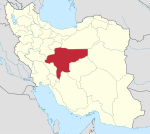Nushabad
Nushabad
نوش آباد | |
|---|---|
City | |
 Entrance of the underground city | |
 Nushabad | |
| Coordinates: 34°04′47″N 51°26′12″E / 34.07972°N 51.43667°ECoordinates: 34°04′47″N 51°26′12″E / 34.07972°N 51.43667°E | |
| Country | |
| Province | Isfahan |
| County | Aran va Bidgol |
| Bakhsh | Central |
| Population (2016 Census) | |
| • Total | 11,838 [1] |
| Time zone | UTC+3:30 (IRST) |
| • Summer (DST) | UTC+4:30 (IRDT) |
Nushabad (Persian: نوش آباد, also Romanized as Nūshābād; also known as Noshābād)[2] is a city in the Central District of Aran va Bidgol County, Isfahan Province, Iran. At the 2006 census, its population was 10,476, in 2,859 families.[3]
The underground city[]
The underground city of Ouyi (Noushabad), located 5 km north of Kashan, Isfahan province, is considered a notable piece of ancient architecture. As Noushabad city is located in the central desert region of Iran, it experiences harsh weather. During the day, Noushabad has a very hot temperature and during the nights it gets notably cold.
The reason why this city is called Noushabad (meaning the 'city of cold tasty water') is because in ancient times, one of the Sassanian kings who were passing through this area stopped here to drink water from a well and he found this water extremely clear and cold. Therefore he ordered the building of a city around this well and named it Anoushabad, which eventually turned into Noushabad.
One reason for this underground city being built is thought to be to offer an escape from the high daytime temperature of the region. However the main reason that the underground city of Noushabad was carved stemmed from the fact that in the past, this region was insecure, suffering from raids, and by forming an underground chain of passages beneath the entire city, the inhabitants could shelter there during such attacks. Through these passages they could reach any spot in the city without being seen.
The depth of this underground city varies from 4 to 18 meters. To reach the underground city there were several different openings. Some of these openings were located inside the houses of people and others were located in important gathering places, such as the main fort just outside the city. People could live in the underground passages for several days without the need of to go outside.
There are three levels in this underground city, planned in such a way that going to the different levels required moving from down to up. This made it easier for the people sheltering in the underground city to prevent enemies from getting to the upper levels. Another interesting feature of their architecture was the curvy passages that made it possible for the inhabitants to ambush enemies. Furthermore there were several other tricks that were used to resist against the enemies, for instance digging deep holes in the middle of the rooms and covering them with rotating stones that would fall down if anyone stepped on them. [4]
Gallery[]
References[]
- ^ https://www.amar.org.ir/english
- ^ Nushabad can be found at GEOnet Names Server, at this link, by opening the Advanced Search box, entering "-3077362" in the "Unique Feature Id" form, and clicking on "Search Database".
- ^ "Census of the Islamic Republic of Iran, 1385 (2006)" (Excel). Statistical Center of Iran. Archived from the original on 2011-11-11.
- ^ http://www.civiltect.com
- Populated places in Aran va Bidgol County
- Cities in Isfahan Province
- Underground cities



